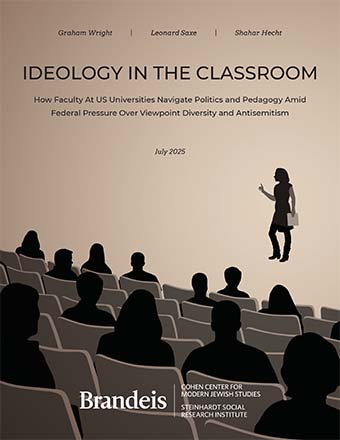Ideology in the Classroom: How Faculty at US Universities Navigate Politics and Pedagogy Amid Federal Pressure Over Viewpoint Diversity and Antisemitism
Graham Wright, Shahar Hecht, and Leonard Saxe
July 2025
This study explores how faculty at US universities think about contentious political issues and how these issues are addressed in the classroom. The report examines the political identities and viewpoints of faculty, their levels of political activism, their concerns about being targeted because of their political views, their approach to addressing current political controversies in the classroom (climate change, racism in America, Donald Trump and American democracy, Russia-Ukraine, and the Israel-Palestine conflict), and the extent to which they hold hostile views about Jews and Israel. The study is based on a survey conducted in spring 2025 of more than 2, 200 faculty at the 146 Carnegie-2021 classified R1 universities, who taught undergraduates in the 2024-25 academic year. This study provides insights about the role faculty play in shaping the climate on campus, in light of the intense focus on viewpoint diversity and antisemitism at US universities and ongoing related federal investigations and funding cuts to university programs.
Read the technical appendices
Related opinion piece: Faculty are not the enemy, Inside Higher Ed, August 18, 2025
Key Findings
- Most faculty identify as politically liberal but have a wide range of views on controversial political issues. More than two thirds of faculty identified as liberal, while one third identified as moderate or conservative. However, their opinions differed with respect to specific political issues. There was overwhelming agreement among faculty that climate change is a crisis requiring immediate action and that President Trump is a threat to democracy. At the same time, less than half of faculty supported returning all land seized through colonization to indigenous peoples, and a substantial minority expressed conservative positions on issues related to gender identity, immigration, and DEI.
- Only a minority of faculty are politically active on issues related to climate change, racism in America, Donald Trump and American democracy, Russia-Ukraine, or the Israel-Palestine conflict. Notwithstanding their own political views, only a minority of faculty had been involved in activism or had posted on social media in relation to any of these five issues. Participation in political activism and posting on social media was highest with respect to Trump and American democracy (44%) and lowest with respect to Russia-Ukraine and the Israel-Palestine conflict (22% for Russia-Ukraine and 21% for the Israel-Palestine conflict).
- Many faculty members are concerned about the consequences of holding liberal political views. Half of liberal faculty members and 70% of extremely liberal faculty members expressed serious concerns about being targeted by the federal government for their political views.
- Many contentious issues that dominate news headlines do not come up often in college classes. For example, despite the intense focus on how faculty teach about Israel, more than three quarters of the faculty in our sample reported that, over the past academic year, the Israel-Palestine conflict never came up in class discussions, and less than 10% reported actively teaching about it.
- When teaching about contentious topics, most faculty say they would present arguments from a variety of perspectives and encourage students to make up their own minds. Whether they actively taught about these political topics or not, only a small percentage of faculty, less than 10% for most topics, said that they would teach as if there was only one legitimate perspective on the controversy.
- The vast majority of faculty do not endorse statements widely considered to be antisemitic. Only around 3% of non-Jewish faculty had a pattern of views about Israel that are generally described as antisemitic by formal definitions put forward by Jewish organizations and that Jewish students tend to see as antisemitic (such as denying Israel’s right to exist). An additional 7% of non-Jewish faculty had a pattern of explicitly hostile views toward Jews as a people. Faculty who were extremely liberal were the most likely to be hostile to Israel, while those with more conservative political views, including those who were the most critical of DEI, were the most likely to be hostile to Jews. However, those faculty with the strongest views on DEI, Israel, or decolonization were still unlikely to indicate hostility to either Jews or Israel.